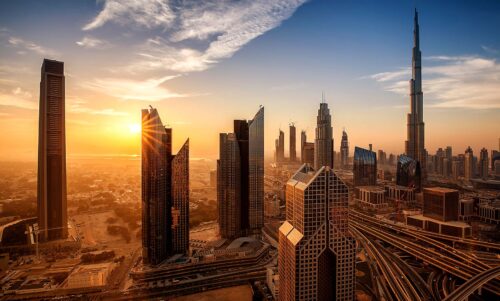
What to Expect in Dubai: Prioritizing Pragmatic Progress at COP28
The global climate confab commences Nov. 30. RMI’s top COP veterans share their take on what’s needed, and what might — or might not — unfold.
RMI heads to COP28 guided by a deep legacy of “applied hope” — as much a vision of inspiration as a pragmatic playbook for success. When the right solutions are amplified by market forces, keen capital, and smart policy, the combination can unlock bigger shifts, faster, than most people think possible.
Heading into this year’s global climate meeting in Dubai — in a moment some are calling the “messy middle,” where rapid progress is tempered by conflicting signals — the world has never needed this marriage of pragmatic hope and urgent implementation more.
To be sure, there is good news. Sustained, soaring growth in solar and wind energy means fossil fuel’s role in electricity production has peaked forever, and electric vehicles (EVs) are multiplying globally. Yet at the same time, as the UN’s global stocktake shows, countries are not on track to protect our communities from the worst consequences of overheating, whether extreme fires and destructive storms or lower crop yields and costlier food.
Galvanized by this urgency, RMI sees that while the transition to clean, safe energy is accelerating, the imperative is rising to further speed this shift and broaden its reach. It is becoming clearer that acting later will be too late.
Pragmatic progress
The road through and beyond this climate summit is reasonably clear. We see a pathway to success if countries, in partnership with the private sector, continue to do much of what is already underway, but faster.
RMI supports COP’s high-level goals of tripling renewables (3xRE) and doubling energy efficiency (2xEE) gains by 2030. To get there, we see enormous opportunity in the following areas:
- Scaling up green hydrogen, building out reliable grids, simplifying permitting processes, improving regulatory systems, and speeding up clean energy deployment in the Global South through transition finance, job creation and workforce training, and by accelerating the preparation and de-risking of renewable energy project portfolios which can be financed and deployed at scale.
- At the same time, we need to reduce demand for and curb pollution from fossil fuels today. One critical step to do this quickly is by reducing methane emissions. We must invest in tools to make emissions visible at every stage in global supply chains and spur action to cut methane leakage at the source.
Broader COP priorities
Clearly as we may see the road ahead, the reality is that many COPs have begun with the promise of major progress only to end in disappointment. With this conference taking place in one of the world’s top fossil fuel producers, optimism is even more restrained than usual.
That said, past breakthroughs have come in the face of low expectations. Notable recent wins include the Paris Agreement at COP21 in 2015 and even the agreement on a new loss and damage fund at COP27 in Sharm el-Sheikh, Egypt last year.
The success of this climate conference will pivot on a few fronts.
The potential starts with scaling renewables and efficiency. The clearest expression of this goal comes from The Global Renewables Alliance, via their call to world leaders to commit to a target at COP28 to triple global renewable energy capacity to at least 11,000 GW by 2030 and to double energy efficiency improvement rates. RMI is a signatory to this campaign.
Achieving ambitious renewables goals is no longer constrained by the technologies’ upfront price. Costs have fallen so far that other factors have emerged as bigger barriers to scaling. To advance, the implementation of renewables must not only prioritize streamlining access to low-cost finance, but also include easier technology transfers and building technical knowhow among utilities, regulators, professionals, and others.
A COP success story will also include clearer commitments to accountability, transparency, and rigor. Players must avoid pressure to water down a declaration that has no legal status and that leaves options to opt out. And as we have seen before, there is also the prospect that some countries will refuse to sign on, leaving nations — as well as the private sector and civil society — to lead the way. Alternatively, delivery support and tracking mechanisms could be left to be determined in the future via individual announcements and pledges, though this is not an ideal situation.
Not least of all, agreeing on whether, how, and when to phase out uncontrolled fossil fuels will likely be among the meeting’s most contentious issues. With overall global emissions continuing to rise, the imperative to lock in a clear plan and viable timeline has never been greater.
What’s ahead?
A lot can happen between now and December 12, when negotiations conclude. At RMI, we’re convinced that the signs are shifting in the right direction, toward a cleaner, more prosperous future.
As we head to COP, we’re clear-eyed on those goals. A safer, healthier, cleaner future is ours for the taking. We travel to Dubai with hope and pragmatic determination that the world’s leaders will see that future too.
Including Dubai, Vikram Singh, a senior director focused on the Global South, has joined four COPs. Dubai marks the 18th climate summit for Laetitia de Martez, a senior director who leads RMI’s Climate Finance Access Network (CFAN) and Islands Energy Program.